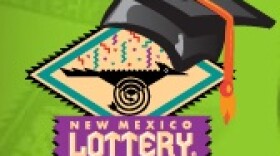The cost of tuition at New Mexico public universities is rising and more students are taking advantage of the lottery scholarship, which pays almost full tuition for qualifying students—but fewer people are buying the scratch-off tickets that fuel the scholarship fund.
That’s one of the factors contributing to a slow-building crisis in scholarship funding.
A bill to change the lottery rules (SB 355) would get rid of the 30 percent requirement for scholarships and supporters say this would allow the program to give away more prizes and attract more players.
In 2007, the state Legislature decided to increase the lottery disbursement to 30 percent of gross revenues. In order to make ends meet, the New Mexico Lottery Authority has had to cut costs—and the amount of cash prizes given out on the scratchers.
But now they say that’s part of the reason why sales are down, and there’s less money to give to the scholarship fund.
“Thirty percent of $100 million doesn’t deliver as much to the bottom line as, say, 27 percent of $150 million,” said state Sen. John Arthur Smith, D-Deming. Smith, the sponsor of the proposal.
Although the bill passed the state Senate 25-17, the vote was not strictly along party lines. State Senator Lisa Torraco, R-Albuquerque, was one of the three Republicans and 13 Democrats who voted against the bill.
“When you take away that 30 percent we run the risk that the amount of money that actually goes to student tuition scholarships could be decreased and that’s too great of a risk for me,” Torraco said Friday.
Lawmakers have tried several ways to shore up the lottery scholarship, including pouring liquor tax money into it, raising the GPA and course load requirements for students, and paying for fewer semesters. Still, the fund is expected to run short.
Lottery vendors have hired powerful lobbyists aligned with Gov. Susana Martinez. Intralot, which recently extended its contract through 2018, donated $5,000 to the governor during the last election cycle; GTECH gave $5,200.
In the past, the same vendors have been criticized for unsavory business practices, bribery and too-cozy relationships with lawmakers in other states (New York Times: "Divide and Conquer: Meet the Lottery Titans" and "Lottery Deal Bid Process is Attacked").
But there's no question some changes must be made if every student who qualifies is to receive a full scholarship.
“The idea is to reestablish market share [for scratch-off games] and that’s questionable, I admit that,” Smith says, acknowledging that it’s possible New Mexicans may not be persuaded to buy as many game tickets as they used to. “But on the course we’re on, we’ll be getting 30 percent of less sales."
The bill says that disbursements to the scholarship fund cannot be less than they were in fiscal year 2015, a provision that Smith likens to an insurance policy.
Other elements of the bill would allow customers to buy lottery tickets with debit cards (but not credit cards) and would allow the state to contract with lottery vendors for 10 years.
This story is part of a reporting partnership between New Mexico In Depth, KUNM and NMPBS, People, Power and Democracy, that attempts to pull back the curtain on how the New Mexico Legislature works and, in some cases, doesn’t. It's funded by the Thornburg Foundation and the Loeks Family Fund.





